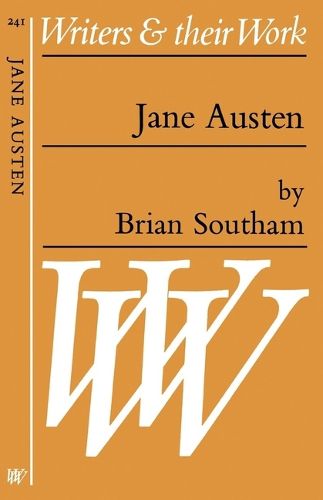Readings Newsletter
Become a Readings Member to make your shopping experience even easier.
Sign in or sign up for free!
You’re not far away from qualifying for FREE standard shipping within Australia
You’ve qualified for FREE standard shipping within Australia
The cart is loading…






There have been innumerable reinterpretations of her work but no revaluations. Brian Southam shows how different readers and critics have reacted to her work - from perceptive and appreciative review of Emma by her contemporary Sir Walter Scott, to the admiration of D. H. Lawrence, who nonetheless assessed her as 'a narrow-gutted spinster.' Mr Southam considers how Jane Austen invented her own special mode of fiction, limited and highly selective, using as her material the quiet everyday domestic life of middle-class country families in Regency England, and how behind the wit and irony lay an awareness of the problems of social existence, in particular the women's predicament in striving for self-determination and identity in a world of convention ruled by men.
Brian Southam, formerly a lecturer
in English at the University of London, and Editorial Director of Routledge and Kegan Paul Ltd; he has written and edited books on Jane Austen, Tennyson and T. S. Eliot, and articles on many other authors, including Shakespeare, Milton, Gibbon, Keats and Yeats.
$9.00 standard shipping within Australia
FREE standard shipping within Australia for orders over $100.00
Express & International shipping calculated at checkout
There have been innumerable reinterpretations of her work but no revaluations. Brian Southam shows how different readers and critics have reacted to her work - from perceptive and appreciative review of Emma by her contemporary Sir Walter Scott, to the admiration of D. H. Lawrence, who nonetheless assessed her as 'a narrow-gutted spinster.' Mr Southam considers how Jane Austen invented her own special mode of fiction, limited and highly selective, using as her material the quiet everyday domestic life of middle-class country families in Regency England, and how behind the wit and irony lay an awareness of the problems of social existence, in particular the women's predicament in striving for self-determination and identity in a world of convention ruled by men.
Brian Southam, formerly a lecturer
in English at the University of London, and Editorial Director of Routledge and Kegan Paul Ltd; he has written and edited books on Jane Austen, Tennyson and T. S. Eliot, and articles on many other authors, including Shakespeare, Milton, Gibbon, Keats and Yeats.